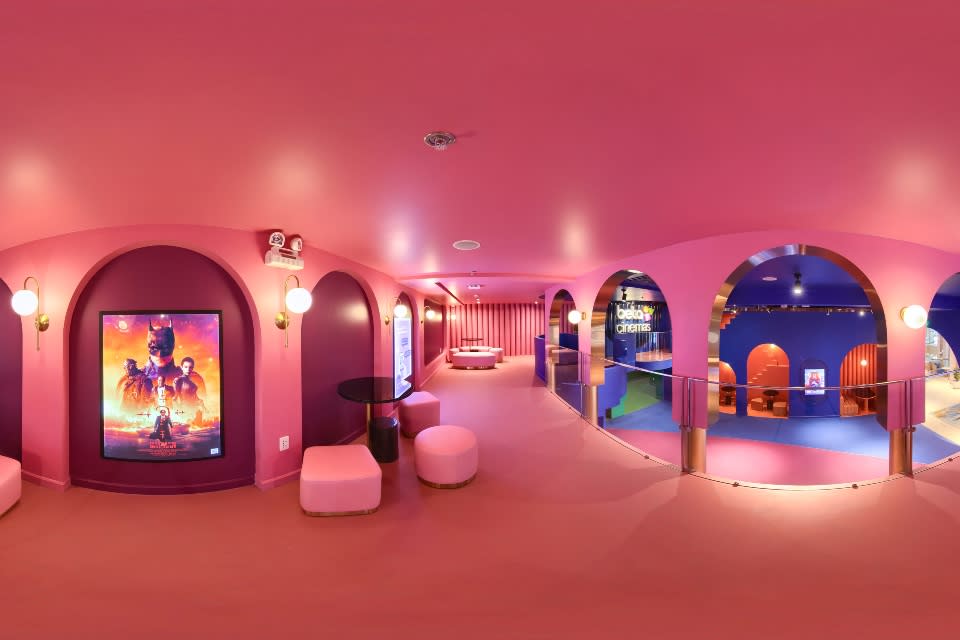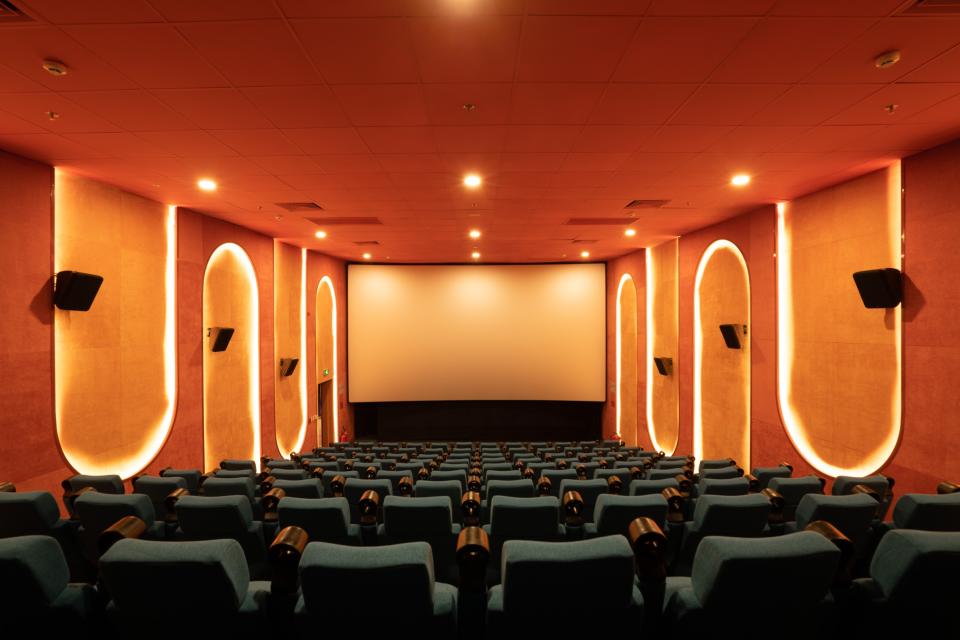International Disruptors: Beta Group’s Minh Bui On Shaking Up Vietnam’s Expanding Cinema Market With “Affordable Theatre” Chain Beta Cinemas

Welcome to Deadline’s International Disruptors, a feature where we shine a spotlight on key executives and companies outside of the U.S. shaking up the offshore marketplace. This week, we’re talking to Vietnamese entrepreneur Minh Bui whose Beta Cinemas chain has introduced a new concept of affordable but trendy theatres to Vietnam’s fast-growing cinema market. Deadline sat down with Minh in Ho Chi Minh City to talk through how he launched the company, his business model and ambitions for the future. This was followed by an unannounced visit by Deadline to a Beta Cinemas site in Go Vap, Ho Chi Minh City, to watch a Vietnamese comedy accompanied by a very large tub of caramel popcorn, during which there were no discernible differences with the high-end multiplexes in the country (and the popcorn was delicious).
The Beta Cinemas chain has an instantly recognizable and, more importantly, instantly Instagrammable design, appealing to Vietnam’s Millennials and Gen Z consumers, who make up a large proportion of the country’s cinema audience (see images below). Ticket prices are also student and middle-income friendly, at around $2 (VND45,000) compared to $4 (VND100,000) for the country’s high-end multiplexes.
More from Deadline
After studying overseas and working as a commodities broker in Singapore, Minh says he could look at the Vietnamese market as an outsider and identified an opportunity for a new kind of cinema chain. Vietnam’s previously state-run cinema industry was built out by Korean majors CJ CGV and Lotte Cinema and local studios Galaxy and BHD and has grown from just 90 screens in 2010 to 1,100 screens with an annual box office of $150M last year. But with tickets priced at around $4-5, these chains are mostly aiming at middle-class customers in the big cities.
“I saw that the vast majority of Vietnamese people don’t have enough income to pay that much for a movie ticket, let alone also buy popcorn and drinks, so I wanted to create a product that could disrupt the market and build a mass market business,” says Minh, adding that he initially targeted second-tier cities and suburban areas that had never had a cinema before. “My aim was to price tickets at about 50-60% of what the leaders in the market were charging.”

Minh already had experience as an entrepreneur, previously running several businesses in Vietnam including Doco Donuts, a chain of donut stores that he sold before studying for an MBA at Harvard Business School. Upon his return home from the U.S., he scraped together what was left from that sale and borrowed some money to open his first cinema – a three-screen in Thai Nguyen province in north Vietnam.
“We found a location that was cheaper, because it wasn’t slap bang in the city center, and asked equipment suppliers to provide us with some financing options, so the entire cost of the cinema was just half a million dollars,” Minh explains. “That first location became profitable right away; within the first full month of operations, we had positive EBITDA, and the people there were crazy about it. They were so excited to finally have a cinema in their town.”
Since then, the chain has grown to 18 locations with more than 60 screens, including sites in major cities such as Hanoi and Ho Chi Minh City and revenues have grown from $7.7M in 2019 to $13M in 2023 – outperforming the market’s post-pandemic recovery. Beta Group has also expanded into other areas including film production and distribution and the F&B industry.
Growth was also made possible through three funding rounds, resulting in a valuation of more than $40M, starting with Vietnam Investments Group in 2015 and followed by Hong Kong-based Blue HK in 2017 and Japan’s Daiwa PI Partners in 2020, the latter happening during the depths of Covid when Vietnam went through successive waves of cinema closures.

“Covid was tough but luckily we’d raised funding from Daiwa before the pandemic and they honored that,” says Minh. “That really helped us get through the pandemic. We’re very proud that during that period, when our cinemas were closed around half of the time, our EBITDA was still positive, which shows the efficiency of our model. We negotiated rental fees, deferred payments and cut management salaries, but we didn’t lay off any staff.”
Bouncing back from the pandemic, by fiscal year 2022 revenues had reached 177% of 2019 earnings, surpassing Vietnam’s overall market recovery rate of 78%. While a few other start-ups have followed Beta Group’s lead and also launched low-cost cinemas, the company aims to have a 70% share of the affordable segment market and revenues of $60M by 2030. Vietnam’s cinema market still has plenty of room to grow with only 11 screens per million people, compared to 42 in China and 127 in the U.S.
Cost-effective model
Minh says the company is able to sell cheaper tickets due to what he describes as optimized operations: “We don’t skimp on projectors and audio equipment, so the audience has the same experience as in any other cinema. But we save on location, so we don’t move into the fanciest buildings, and our space is optimized, so we don’t have a lot of empty space in the lobby for example. We also use locally sourced materials and manage construction in-house to reduce the costs. We use contractors for the final layer, but we don’t have multi-layer contractors, because that’s a cost that can really add up.”
While Beta Cinemas finances most of its own locations, some are operated on a franchise basis, where other companies cover the investment while Beta is responsible for setting up and managing the site. The company offers three franchise models, each tailored to suit different markets and investment capabilities, and each with a different pricing structure per cinema hall.
“For every cinema we invest ourselves, we need to make sure we earn back the money within about three years,” Minh explains. “Then for the franchisees, if they’re going for return on investment, then we’re always very transparent with them on how long the project is going to take to pay back.
“Not all of them are looking for a fast payback – for example there are high-end hotels and resort complexes that just want an additional amenity for their guests, so they’re happy with a four to five year payback. But for a very good location, we try to ensure they get payback within three years.”
Not surprisingly, this efficient low-cost model has attracted interest from other middle-income countries that are attempting to build out their cinema infrastructure. Minh says he’s already fielding calls from overseas and is open to collaboration with international partners, at least on the franchising model. “There are lots of things we do really well after ten years, and Vietnam is the perfect market to develop expertise in reducing costs; you won’t find anyone doing this in Korea or Singapore for example,” Minh says. “But it doesn’t make sense for us to take our own money and invest it outside. There’s still a lot room for growth in the Vietnam market.”

Business models like these could offer a glimmer of hope for the global theatrical market which has failed to recover to pre-pandemic levels of business, especially in developed markets, where cinema owners are trying to make up losses by increasing ticket prices. In developing markets, Millennial and Gen Z audiences are the ones most likely to prise themselves away from sofas and streaming apps to visit the cinema, but they are also the most price sensitive consumers.
Outside of the theatres business, Minh says he’s also looking at expanding Beta Group’s production and distribution activities. The company had a box office success with 2017 romantic comedy Get Married, which was a remake of an Indonesian film, and has acquired foreign films to distribute in Vietnam including French animation Ballerina and Taiwanese action comedy The Village Of No Return.
But Minh says he’s taking this business slowly and at this stage regards it mostly as a learning experience. He produced and also starred in Get Married (he also made a hit pop song before moving to the U.S. for grad school) but wants to focus on business and has no ambitions to become an actor. “I wasn’t very good at it,” he laughs. “But I saw it as a way to get involved and really have a hands on experience of the movie business. I don’t want to be one of those executives who just sits in his office and phones in to his team to give orders.”
Best of Deadline
The Movies That Have Made More Than $1 Billion At The Box Office: Photo Gallery
Hollywood & Media Deaths In 2024: Photo Gallery & Obituaries
2024 Awards Season Calendar - Dates For Writers Guild, Tonys & More
Sign up for Deadline's Newsletter. For the latest news, follow us on Facebook, Twitter, and Instagram.

 Yahoo News
Yahoo News 
